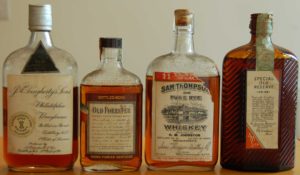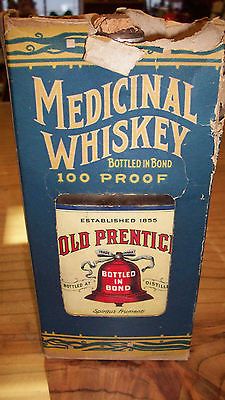While it is slowly becoming common knowledge that Pennsylvania is the birthplace of American whiskey, I’m often asked, ”Why is Pennsylvania only now showing signs of distilling life again?” The truth lies in the duration and aftermath of Prohibition. In 1899, there were close to 965 distilleries in the country with about 400 of them located in Pa. By 1914, that number had been reduced to 434, and by Prohibition, there were only 27-33 left. (ref.- http://www.bottlebooks.com/american%20medicinal%20spirits%20company/american_medicinal_spirits_compa.htm) Consolidation and the shuttering of so many distilleries left the distilling industry on the brink of collapse. The reality was that the political will and capital that remained in support of distilling would begin to focus mainly on Kentucky where the majority of the whiskey stocks lay. The remaining distilleries and whiskey stocks in Pennsylvania were being bought up and consolidated by interests outside of the state. This proved to be the beginning of a slow decline for Pennsylvania’s proud distilling heritage.
After Prohibition had been ratified in 1920, only six distilleries had acquired licenses to produce medicinal whiskey. Though Schenley is often considered a Pennsylvania brand because its roots were here, its headquarters after Prohibition were in the Empire State Building in NYC, and its base of operations were in Lawrenceburg, Indiana. The distilleries left in the state were often used to produce whiskey for other brands. A power shift of sorts had taken place.
These are the 6 licensed medicinal whiskey producers-
1. Brown-Forman– (KY) The only distillery that still exists today. Of course, it is a massive distillery complex now.
2. A. Ph. Stitzel Distillery– This distillery was the predecessor of Stitzel-Weller. During Prohibition, the distillery was run by the now famous Julian “Pappy” Van Winkle. They were the first to obtain permission to distill new whiskey on premises after 1929. The company was sold to Norton-Simon Inc in 1972 and would become the property of United Distillers (Diageo) in 1992.
3. Glenmore– (KY) The Thompson family, which owned Glenmore during Prohibition, owned the company until 1991, then sold to Guiness. Guiness merged with Schenley to became United Distillers which was absorbed by Diageo. The distillery was bought by Sazerac in 2009.
4. Frankfort Distilleries (KY) – Home to Four Roses. Owned by the Paul Jones Company during Prohibition. Purchased by Seagrams in 1943.
5. Schenley (consolidation)- This one was created from a consolidated number of distilleries by Louis Rosensteil during Prohibition. It was named after the original Schenley Distillery in Schenley, Pa. This would become one of the big four. Schenley became oen of the largest liquor companies in the U.S. The company would be sold to Guiness in 1987. Guiness merged with Schenley to become United Distillers which would be absorbed by Diageo.
6. American Medicinal Spirits (AMS) (consolidation)- American Medicinal Spirits was the Wathen family’s answer to prohibition. It was created around 1920 from the consolidation of their own R.E.Wathen Distillery in Louisville with other small distilleries. Their major brand was Old Grand Dad, but they would come to acquire large stocks of Old Overholt as well. The owner of Old Overholt was Andrew Mellon, the industrial era tycoon, who was given 2/3 majority stake in the company after the death of his close friend, Henry Frick, the last remaining descendant of the Overholts to own the brand. In 1921, Mellon became Treasury Secretary under President Warren Harding. He used his ability to appoint medicinal whiskey licenses to grant a license to the American Medicinal Spirits Company, holder of Old Overholt stocks. Toward the end of Prohibition, the Wathen family sold AMS to National Distillers in 1929. National Distillers sold the brand to Fortune Brands (would become Jim Beam) in 1987.
* Andrew Mellon’s first wife was one of the owners of Guiness, though they were divorced in 1912. The president of AMS was Otho Wathen. Wathen was also vice president and director of National Distillers. Toward the end of Prohibition, Mellon sold his ownership of Old Overholt to National Distillers (which had absorbed Guiness).
* Mellon was making around $350 million a year toward the end of Prohibition and was the third wealthiest man in the U.S. after Rockefeller and Ford.
* There is irony in Andrew Mellon holding the office of Treasury Secretary, the office originally filled by Alexander Hamilton. It was Hamilton that lit the fires of the Whiskey Rebellion in western Pa by instituting the whiskey excise tax in 1791. It was the rebellion that inspired Abraham Overholt to start distilling in 1810. Now, over 100 years later, the Treasury Secretary means to profit from the prohibition of alcohol- with his own Old Overholt, of course.
After Prohibition, there were the big four- Schenley, Seagrams, National Distillers and Hiram Walker. The largest four had taken advantage of the weakened distillery market by buying up distilleries and their whiskey stocks. National Distillers owned about half of all whiskey stocks after Prohibition. National Distillers grew out of the infamous Whiskey Trust. They were a force to be reckoned with.
People often ask what makes prohibition whiskey so interesting to collectors. I find the labels reveal so much of what was happening at the time. A medicinal whiskey may be bottled, aged and labeled in a contradictory fashion which leads one to wonder where it came from. There were only 6 licenses approved to sell medicinal whiskey, but there are many brands to be found. Understanding the history behind the brands, not to mention the creative methods employed to sell them legally, adds to their allure. Mind you, not all the whiskey is tasty. Some of it is excellent, but there are a lot of bottles out there. Even so, for those whiskey geeks out there that love a challenge and appreciate the history that even the bad whiskey was a part of- Happy hunting!


